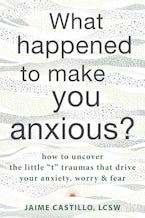Good therapy is like peeling back the layers of an onion. We avoid too much surface-level chatter and instead want to dig deeper, getting to the root of our client’s presenting problems to effect real growth and change.
Peeling back layers that expose our client’s emotions and fears in their rawest form is not always an easy task, however. Sometimes we strike a nerve that causes our clients to feel too vulnerable, leading to a “shut down” response. This is a protective mechanism that probably served our client very well at some point in their life when there was a real threat. When the conversation in the therapy room becomes the threat, this protective part of self can take over and cause our clients to display a numb or disconnected presentation.
When this happens, it can be therapeutic to validate the part of self that became threatened, and explore what triggered this feeling and subsequent response. Doing so might sound something like:
Therapist: I noticed when we started talking about your mother, you seemed to shut down. Is that how it felt to you, too?
Client: Yeah, I guess. I just don’t really like talking about her.
Therapist: Could we be curious about that for a minute? I’m wondering if there is something that feels threatening about talking about her.
Client: I don’t know, I just don’t like to. It makes me too angry.
Therapist: So, there is a part of you that wants to avoid getting angry. When in your life did you learn that avoiding anger was important?
Directly addressing therapeutic blocks, such as protective parts of self that arise in clients, is crucial in fostering greater insight and forward movement in therapy.
Jaime Castillo, LCSW, is founder of Find Your Shine Therapy, and a licensed clinical social worker specializing in the treatment of trauma and anxiety disorders. She is a certified eye movement desensitization and reprocessing (EMDR) therapist and EMDRIA-approved consultant, and has additional training in internal family systems (IFS) and exposure therapy. She specializes in working with adults experiencing post-traumatic stress disorder (PTSD), obsessive-compulsive disorder (OCD), phobias, and generalized anxiety disorder (GAD). Jaime has been featured for her trauma expertise in The Arizona Republic, The Verge, and Phoenix Voyage Magazine where she was named a Top Inspiring Phoenix Professional. She was a speaker at the 2020 Global Resiliency Summit alongside world-renowned mental health professionals, and appeared as a guest trauma and shame expert on The Things We Couldn’t Say podcast.



 Why Journaling Is Especially Helpful to Adult Children of Emotionally Immature Parents
Why Journaling Is Especially Helpful to Adult Children of Emotionally Immature Parents